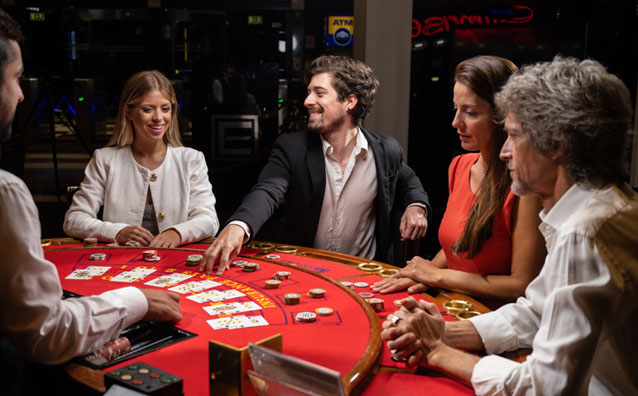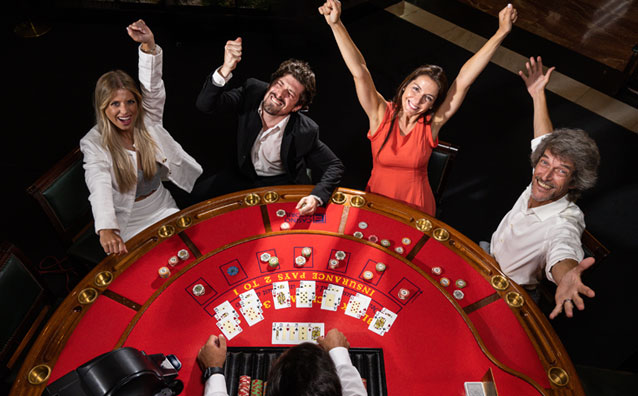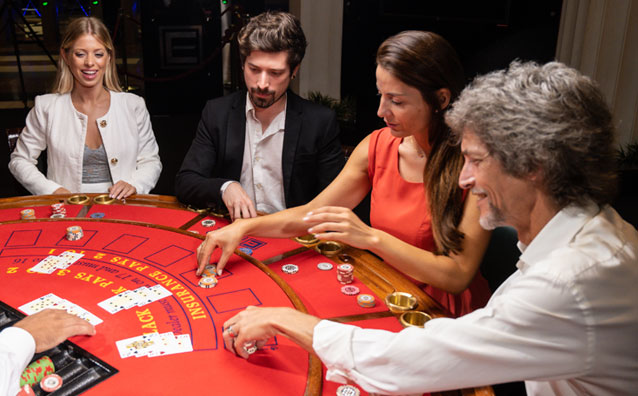BlackJack
A 21 with two cards.
WHAT IS IT
Blackjack is one of the most popular casino games and is probably one of the simplest in terms of its objectives: the player must try to make the total points of his cards be 21, or that, being lower, be higher than the value made by the Bank.
HOW TO PLAY
Players must mark their bet to receive the first card. Each player is dealt two face-up cards.
The Banker draws two cards: one open and one face down.
The player easily retains the value of his cards: the Ace is worth 1 or 11; the King, Queen and Jack are worth 10; and the remaining cards are worth their face value.
If the first two cards dealt to you total 21, you have played Blackjack. The Bank announces Blackjack and pays one and a half times the value of the bet.
However, if the Banker's upcard is an Ace or a card with a value of 10, play will continue until the Banker's score is known.
Players who have played Blackjack may, when the banker's upcard is an Ace, choose to receive an amount equal to their bet before knowing what the bank's second card is.
In case you don't do Blackjack with the first two cards, you can choose to "stay" (don't ask for cards) if your score is higher than 11, or "continue" (request additional cards) until you get the desired score, without exceeding 21 .If you exceed 21, you lose your bet.
After all players have decided, the bank turns over their second card. In the event that the banker's cards total 17 or more, the dealer does not draw more cards for himself.
If they reach 16 or less, the dealer must draw cards until reaching, at least, the score of 17. Whenever their score is closer to 21 than the Banker's, the player will win an amount equal to their bet, losing the bet. otherwise.
In the event that the player and the Bank have the same score, there is a tie.
However, the Blackjack combination always wins a total of 21 made by other cards.
IMPORTANT TO KNOW
PAIRS DIVISION
Whenever you receive the first two cards with the same value, you can separate them and make two independent bets as long as you play in each of them an amount equal to the initial stake. Each play must be completed separately. If there is a split of aces, only one card will be dealt to each ace. In the case of a card with a value of 10 being dealt to any of these aces, the play will be considered 21 and not Blackjack.
BET DUPLICATION
When the values of the first two cards total 9, 10 or 11, you can double the bet, being then dealt a single card, and the chips delivered by the player must be placed by the croupier.
INSURANCE
When the dealer's open card is an Ace, and after the second cards have been dealt, you can “insure” your bet, in an amount up to half of the bet already made. In the event that the Bank makes Blackjack, the bet made on the “insurance” will win twice its value, being lost otherwise.
DISCLAIMER
The player may forfeit the move, losing half the amount bet, as long as the dealer's upcard is not an Ace. This decision must be made after the first two cards have been dealt to the player and the dealer, and cannot be changed.
SPECIAL AWARDS
The player who scores 21 with the cards “6-7-8” of the same suit (regardless of the order in which they are dealt) or with three “7” of any suit, will immediately receive three times the bet, without prejudice to the prize that eventually will be entitled to continue the game.
"JACKPOT" TABLE
In Blackjack, betting on the "jackpot" or jackpot is optional for players who have wagered on the main game. The "jackpot" combinations and proportions, which are paid regardless of whether the player has lost, folded or tied in the main play, are paid according to the paytable displayed on the table.
Be responsible. Play in moderation. Know the policies of responsible gaming.




